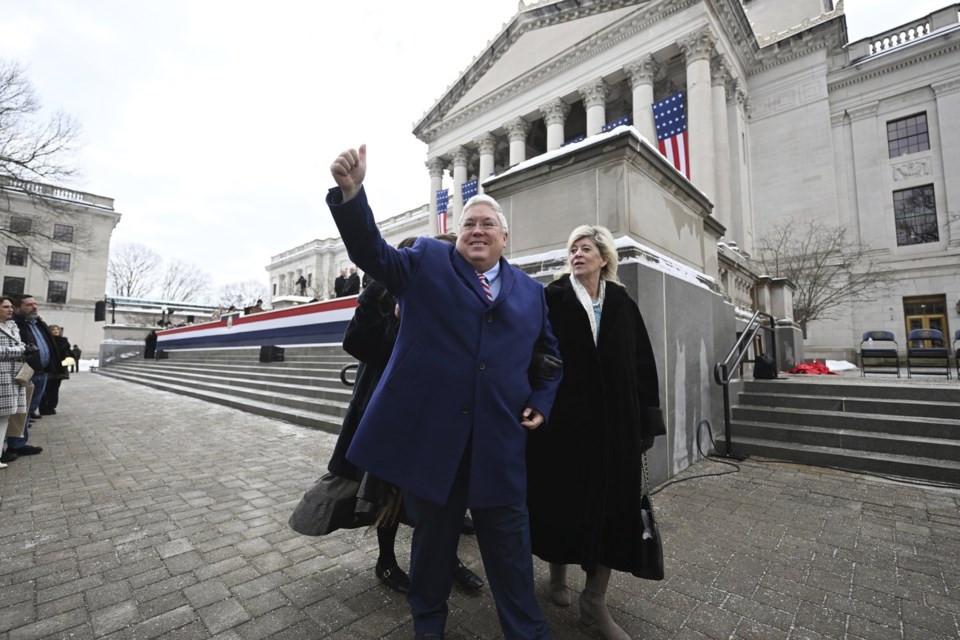CHARLESTON, W.Va. (AP) — U.S. Sen. Jim Justice said he transformed West Virginia's financial policy from cow dung into gold during his time as governor.
But one man’s gold is another man’s ... something else. Newly inaugurated Gov. Patrick Morrisey has taken a closer look under the lid of the state’s coffers, and he said what he has found isn’t so shiny — and it stinks.
Despite the now-U.S. senator's assurances that he was leaving the state in glowing financial condition, Morrisey announced a week into his term that he had “inherited” from the Justice administration a projected $400 million budget deficit for the fiscal year starting in July — one expected to grow to $600 million the following year. Contradicting Justice, he said the former governor didn’t find the money to pay for his record $1 billion-a-year cuts to the personal income tax, collections on which make up half of the state’s general revenue fund and 10% of all state expenditures.
Morrisey is scheduled to present his budget accounting for the deficits on Wednesday during his State of the State address. He will be recommending the Legislature consolidate several state agencies, along with other cost-saving measures.
“When they were cutting the taxes, I said, ‘Please continue to cut the taxes, but we must pay for them,’ ” the governor said at a news briefing after taking office. “The taxes have not been paid for.”
West Virginia is one of at least nine states to cut personal income taxes
With budgets bolstered by federal COVID-19 dollars, at least nine states including West Virginia have passed a personal income tax cut since 2021. Supporters say the cuts will boost states' economies, making them more attractive to business. Others tell a different story.
The progressive-leaning Center on Budget and Policy Priorities has warned that expiring federal aid, along with costly new school voucher programs in many states, could lead to challenges funding baseline services like public education, health care and transportation.
“It’s kind of the perfect storm,” said Kelly Allen, executive director of the West Virginia Center on Budget and Policy, part of the center's national network. "All of the spending and tax cuts are starting to hit the budget at the same time that those temporary revenue factors helped us make the case for the tax cuts have subsided.”
Justice — a coal baron and former billionaire who faced a slew of court challenges because of unpaid debts, fines and threats of foreclosure on his dozens of businesses while governor — was repeatedly criticized during his administration for purposefully underfunding agencies and low-balling revenue estimates to create false surpluses.
Meanwhile, he signed laws that are projected to increase in cost over the years: the $1 billion-a-year tax cuts and the Hope Scholarship. One of the country's most open-ended school savings account programs, the Hope Scholarship has no income requirements.
Justice calls governor's budget statement ‘crazy talk’
Justice, who recently started work in Washington after being elected to the seat of now-retired Independent U.S. Sen. Joe Manchin, dismissed Morrisey’s comments as “crazy-talk” in an interview with WCHS-TV, saying he didn’t believe it.
“If I thought we were going to have a $400 million deficit, my hair would be on fire,” Justice told the television station.
Justice and other leaders have pointed to $400 million set aside in a special reserve fund specifically designed to operate a safety net to cover shortfalls caused by the tax cuts. Justice is also leaving office with $1.3 billion in the rainy day fund, which contained less than half a million dollars went he came into office, also during a time of projected deficits.
His statements were backed up by state Treasurer Larry Pack and the House and Senate presidents, who said they were all surprised by Morrisey's announcement. House Speaker Roger Hanshaw told reporters last week he isn’t sure West Virginia is facing a budgetary crisis.
“We don’t share the belief that we’re in quite the same budgetary situation that others have suggested we are,” Hanshaw said.
Justice claims credit for turning state's finances around
Justice repeated a rags-to-riches tale often during his eight years as governor, which began in 2017 when he famously vetoed West Virginia’s budget — facing a $500 million deficit when he took office — by comparing it to literal bovine feces he brought to the state Capitol. Signing the final tax cut out of more than $1 billion over his two terms, he touted years of flat budgets and record billion-dollar surpluses by unveiling the same platter he used in 2017, now topped with gold.
“Look what we got here today,” he said. “The cow dung went away, and today we’ve got gold bars.”
Justice said cutting taxes would spur business growth and economic revitalization in one of the nation’s poorest states, which has been hit hard by the opioid epidemic and lost coal industry jobs. He signed a 21.25% personal income tax cut in 2023, followed by an additional 6% in cuts finalized this past summer.
Justice was accused repeatedly during his administration of underfunding state agencies to maintain flat budgets and create false surpluses, then calling lawmakers back to the Capitol for special sessions to pass supplemental appropriations bills.
Morrisey, who served as the state’s Attorney General before he was elected governor in November, said his projected deficit is the product of years of relying on federal dollars and using one-time money to fund ongoing expenses. Part of the $400 million hole includes the state having to come up with $153 million to cover Medicaid, a program that insures nearly one-third of all West Virginians, Morrisey said. Other costs include funding or state employees' health insurance and education.
The governor said rainy-day funding should be kept on hold for emergencies, not used to pay for baseline expenses. Justice's “flat budgets” never existed, he said.
“We can’t rob Peter to pay Paul and push all the bills to future generations," Morrisey said.
Leah Willingham, The Associated Press



